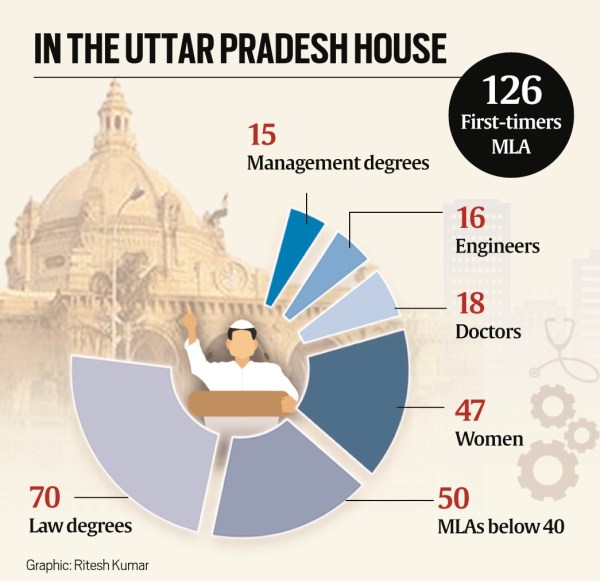Speaker groups MLAs according to their professional degrees, gender and legislative stints; at meeting of women MLAs, a grouse: male colleagues set the agenda
There’s little in common between Alam Badi, 86, and Harsh Vardhan Bajpai, 42. Members of rival parties in the UP Assembly – Badi is a veteran Samajwadi Party leader and Bajpai is a second-time MLA – the two have often faced off across the aisle. Recently, however, the two legislators, part of a group of engineer-MLAs in the House, sat down to discuss how they could use their professional degrees to help their constituencies.
While Alam has a diploma in engineering that goes back almost five decades, Bajpai graduated with a BTech degree in 2007 from UK’s Sheffield University.
In a first for the polarised and partisan world of Uttar Pradesh’s politics, an exercise by the Speaker of the Assembly to group legislators according to their professional degrees, gender and legislative stints, is helping them exchange ideas and experiences without the constraint of party whips and ideologies.
So far, Speaker Satish Mahana has held meetings with at least six such groups – of doctors, engineers, management degrees, women, MLAs under 40 years of age, and those who have had five or more legislative terms.
Started about a month and a half ago by the Speaker as an initiative to “develop a better rapport” with the MLAs and for “better functioning” of the 403-member-strong House, it is now a platform for legislators cutting across party lines to bond over shared concerns and come up with solutions.
The UP Assembly, which has for long fought a severe perception battle – over 50 per cent of the MLAs have a criminal background, according to the latest data by the Association of Democratic Reforms (ADR) – has, with this exercise, come up with some flattering data on its MLAs: the 18th Assembly has 18 doctors, 16 engineers, 15 with management degrees, over 70 with law degrees, 47 women, 126 first-timers, and about 50 MLAs who are below 40.
“People think of MLAs as being uneducated and rowdy. As a member of the UP Assembly for over three decades, I know that this is not true. I hope to change that perception by motivating members to use their professional skills, along with their leadership qualities,” said Speaker Mahana.
“I have asked different groups to use their professional skills for the betterment of their constituencies. For instance, MLAs with a medical degree can work as a link between the Chief Medical Officers in their constituencies and the government, and take proposals forward,” he added.
As the Speaker’s office grouped the MLAs, they realised that someone like Dr Surabhi, the Apna Dal (Sonelal) MLA from Kaimganj in Farrukhabad, would have to be grouped in multiple baskets – and attend multiple meetings. Surabhi is a dentist by training and also has a degree from IIM Calcutta. Besides, as a woman legislator, she would have to be in the group for women MLAs as well.
At one such session with the Speaker, women MLAs, cutting across party lines, spoke of how their male colleagues usually set the agenda while they did not have enough opportunity to bring up their issues.
Following this session, the Speaker promised to take the issue to the Business Advisory Committee of the House and said that an entire day could be set aside for women MLAs in the upcoming session of the State Assembly expected later this month.

“When the women legislatures spoke of how most of them felt hesitant while trying to raise their issues inside the Assembly, I told them that as representatives, they should only think of themselves as representatives of the people. Some of the senior women legislators even came up with suggestions for the younger MLAs.”
Speaking to The Indian Express, Aradhana Mishra, one of only two Congress MLAs in the House, who was part of the meeting with women MLAs, said, “Two major concerns came up during the meeting – one, that many of us do not get an opportunity to speak in the Assembly, which could be because we are fewer in numbers. The Speaker has promised to set aside one day for us to put our questions in the House. The second concern for some was that when we approach government officials for issues related to our constituencies, they do not respond the way they do to our male colleagues. To this, the Speaker promised that privileges of women MLAs would be protected and he would take note if such an issue came to his notice.”
SP MLA from Arya Nagar, Amitabh Bajpai, 48, who has an MBA from Bundelkhand University, said, “We tend to forget how our professional background can come in handy for resolving public issues. After the meeting, it was decided that all of us with management degrees could come up with a better public grievance redressal system in our constituencies. I have started a WhatsApp group for people to share complaints related to water, power and roads. I have also included local officials in the group, so now, every morning, I get updates on issues that were raised and subsequently resolved.”
Neeraj Bora, BJP MLA from Lucknow, who has degrees in medicine as well as management, said, “It came out during the meeting that we could monitor the local health services better with our professional background and can act as a link between health officials working on the ground and the state government to raise the issues of immediate concern.”
The Speaker’s office said that with one round of meetings held with members of all six groups – doctors, engineers, MBAs, women, those below 40, and MLAs who have been elected five or more times – next on the agenda is a meeting with MLAs who have a degree in law, followed by those from agriculture or farming backgrounds. “That should cover all the MLAs,” said a source in the Assembly.

